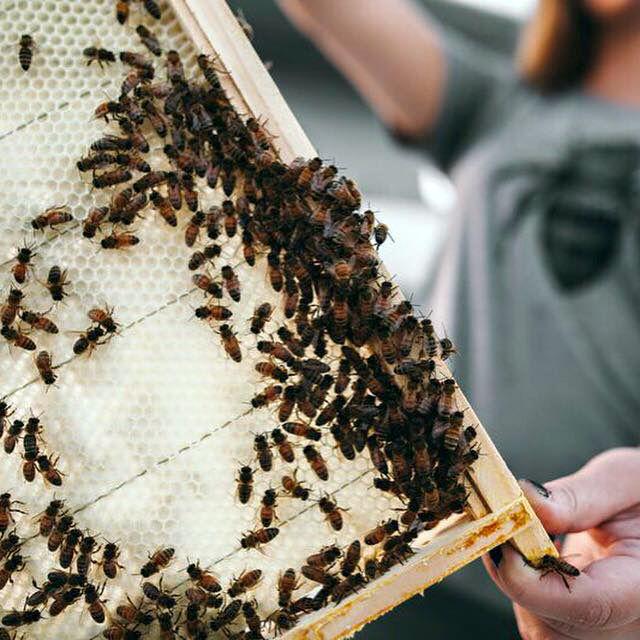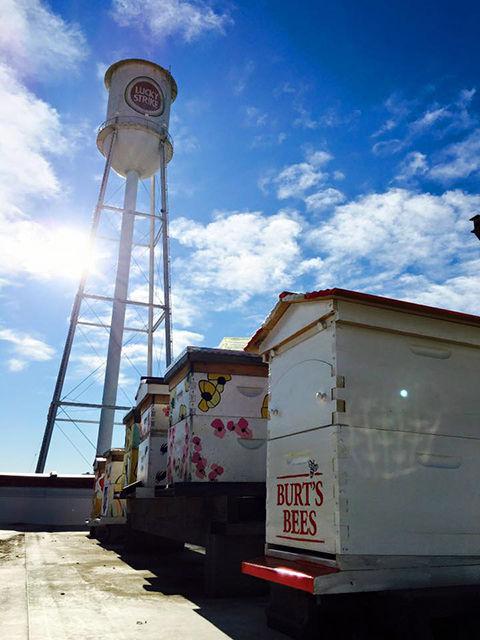As a fourth-generation beekeeper, it seemed clear that bees would have a role in Leigh-Kathryn Bonner’s life. Bonner, a 2015 alumna with a degree in international studies and minors in nonprofit studies and Spanish, is the president and creator of Bee Downtown, a new company in the Triangle area that incorporates local businesses and the community in the restoration of bee populations.
She grew up in Raleigh but spent a significant portion of her childhood on her grandfather’s farm in Eastern North Carolina. The idyllic childhood paradise — complete with cattle, crops, a lake and tree swing — also was home to honeybee colonies maintained by her family. Her uncle, Jerry Flanagan, is a master beekeeper, one of the highest certified beekeeping titles.
“He’s been a great mentor to me,” Bonner said. “[Growing up,] he never pushed us to work the bees, but every grandkid wanted to work the bees. Every niece and nephew wanted to work the bees.”
Beekeeping is surrounded by an air of enchantment. The hum of a colony filled with tens of thousands of bees is almost magically subdued by a bee smoker (a device that produces smoke to mask the pheromones bees emit to communicate with a hive), allowing a beekeeper to disrupt the colony, collect honey and care for the hive. It can create a surreal scene, especially to a child. Bonner’s fondness for beekeeping cultured a deep fascination and prompted a concern for the rising problems of worldwide bee decline.
Bees play a vital role in pollinating crops, accounting for 80 percent of the food Americans consume. However, since 2006, a third of honeybee colonies in the United States have vanished. Causes stem from various sources, including climate change and pesticide use. The phenomenon, called Colony Collapse Disorder, can cause huge negative ramifications in agriculture.
During Bonner’s freshman year, she took Bees and Beekeeping with Professor John Ambrose. In her junior year, she began developing a solution to bee decline. Her senior year, she won first place for the 2015 Lulu eGames, an entrepreneurship initiative at NC State, prototype and design challenge portion for her clear observation hive design, and she also won second place in the new venture portion of the 2015 Lulu eGames for her Bee Downtown business plan. The funding she received from these awards jumpstarted her company.
As an intern at Durham’s American Tobacco Campus, she was able to establish her first rooftop apiary in 2014. She soon made connections with Burt’s Bees, which is also headquartered at ATC, and designed the company’s six-foot clear observatory hive, which is the largest of its kind in North Carolina.
Her rooftop apiary is her main business model. Companies sponsor a hive, which is then painted by a local artist, colonized and maintained by Bee Downtown. Businesses can use this as a marketing tool — not only does it reflect a concern for bees, attracting conscious consumers, it produces honey and educational opportunities, which are both sources of profit.
Bee Downtown has expanded to establish colonies on rooftops and properties throughout the Triangle. Interestingly, bees thrive in an urban setting. It’s a stable environment in that people enjoy colorful, flowering, diverse gardens year-round, which provides bees with a diverse and reliable source of nectar. ATC is particularly suited to the bees’ needs: Through working with the grounds team, the campus is pesticide-free and provides a safe “bee-friendly” foraging site.
Bee Downtown aims to make North Carolina a paragon of urban beekeeping, creating an open, well-educated environment where all benefit from the cultivation and care of bees. The company makes beekeeping more accessible — where before, successful beekeeping was largely reserved for the highly experienced. Currently, understandable, legitimate sources of information regarding beekeeping are minimal, hindering the public’s ability to participate in such a venture. The classes and tours surrounding Bee Downtown’s colonies are the first step in making the science readily available to everyone and are imperative to the repopulation of bees.
Bonner is currently working out of American Underground in Durham, a hub for local entrepreneurs and companies.
“It’s an opportunity to collaborate and work year-round with hundreds of different entrepreneurs, working on their businesses … It’s a great way to experience being downtown, learn more about what it means to have a start-up,” Bonner said. “It’s a great resource to have when questions come up that I don’t know the answer to.”
Through American Underground, Bee Downtown has partnered with another local business, Runaway Clothing Company.
“To really strengthen your own creativity and start a scene, you have to collaborate with other people,” said Gabriel Eng-Goetz, founder of RCC. “We’re here at American Underground, everyone is trying to help each other out, figure out ways we can work together. It just started as a small trade-off and then turned into a full-blown collaboration.”
Runaway has co-designed several goods incorporating Bee Downtown and sponsors one of the hives on top of ATC.
Bee Downtown has captured national attention and widespread recognition, foreshadowing a bright outlook for a positive future. Bonner hopes to soon expand into other cities, such as downtown Boston and Atlanta, to encourage extensive support and cultivate concern for the well-being of one of Earth’s most important insects.
Bee Downtown is located in Durham’s American Tobacco Campus. The organization works with corporate sponsors to establish beehives on the roof of the American Tobacco Campus.









